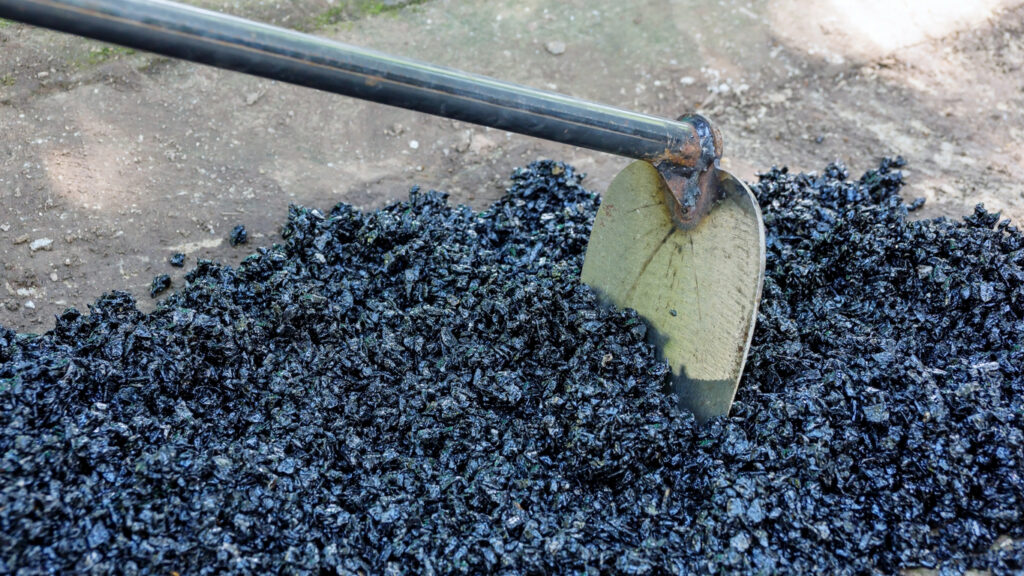
Bitumen is relied on as the primary binder in asphalt mixes developed for roadway paving, with nearly 90% of the world's road paved using the material. Despite its widespread use, bitumen as a sole source of binder in a mix has inherent shortcomings. On its own, bitumen can be susceptible to deformations as temperatures change including cracking in extreme cold and softening during hotter temperatures.
Polymer-Modified Bitumen (PMB) was developed as a performance-enhancing approach to supplement virgin binder in asphalt mixes and bolster their long-term durability. The result can be paved roadways that withstand modern use, including heavy and frequent traffic loads across a wide range of climates and temperatures.
What is Polymer Modified Bitumen?
Polymer-modified bitumen, or PMB, is a blend of virgin bitumen binder and polymer additives formulated to improve the functional characteristics and performance of asphalt roadway surfaces.
Polymers such as styrene-butadiene-styrene (SBS) are designed to improve elasticity and recoverability while plastomers like ethylene-vinyl acetate (EVA) add rigidity and stiffness to a mix. Different amounts of these additives can be incorporated into asphalt mixes to improve stability and overall performance grade. Polymers may also be selected to address different performance requirements, especially for high-traffic areas or regions with extremes in temperature.
These materials are typically added to bitumen either in the pipeline or a binder weight pot. The PMB is then incorporated with aggregate in a drum mixer or pugmill to produce the final asphalt mix. Storage and separation can be problematic when developing a PMB, with some modifiers requiring the use of additional crosslinkers to stabilize the mix. An effective polymer asphalt binder formulation will be adjusted for these requirements.
Benefits of Using PMB in Asphalt Paving
PMB formulations offer a variety of specific performance benefits when added to asphalt mixes. Additives can help improve cohesion and adhesion, reducing the occurrence of stripping and raveling. They can also extend paving life by improving resistance to fatigue, cracking, and rutting. Some polymers can also help enhance water resistance to protect the integrity of surface and base courses.
The polymer additives bind with the bitumen in a mix to enhance viscoelastic properties, adding strength and flexibility to extend pavement life. PMB additives can also help improve workability during mixing and compaction.
All of these factors can result in a series of advantages for departments of transportation, municipalities, and contractors. Longer roadway lifespans resulting from the use of polymer-modified bitumen can result in:
- Extended roadway lifespans that can reduce overall costs for maintenance and repair
- Reduced carbon emissions due to repair activities requiring machinery and new raw materials
- Improved roadway safety through the reduction in accident-causing surface hazards
A Polymer Additive Designed for Bitumen Performance
Polymer-modified bitumen mix design aims to address a variety of performance requirements with a single formulation. To do this, engineers evaluate the different additives and polymers available and look for ways to achieve specifications while also reducing excess material use. Traditional elastomeric and plastomeric polymers have been used to achieve performance specifications while presenting their own challenges. Few are able to address fatigue and rutting simultaneously. Some require additional crosslinkers in order for the PMB to be effective. Others require high shear mixers, longer mixing times, and high mix and paving temperatures, all of which can impact cost and sustainability measures.
PGXpand approaches the challenge of PMB design uniquely. Asphalt mixes dosed with PGXpand exhibit good fatigue resistance while also demonstrating excellent rutting resistance. The additive also reduces mixing times and temperatures for both mixing and paving. PGXpand also eliminates the need for a crosslinker and may also reduce the amount of SBS needed in a PMB mix. Increasing the high temperature performance, paving grade, and softening point of bitumen, PGXpand also improves workability and makes mixes easier to compact.
For more information about PGXpand and PMB formulation, contact info@sripath.com.
